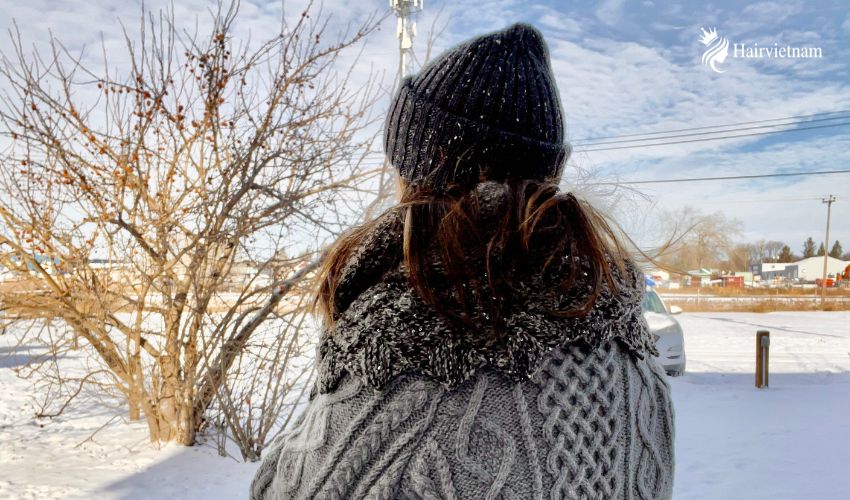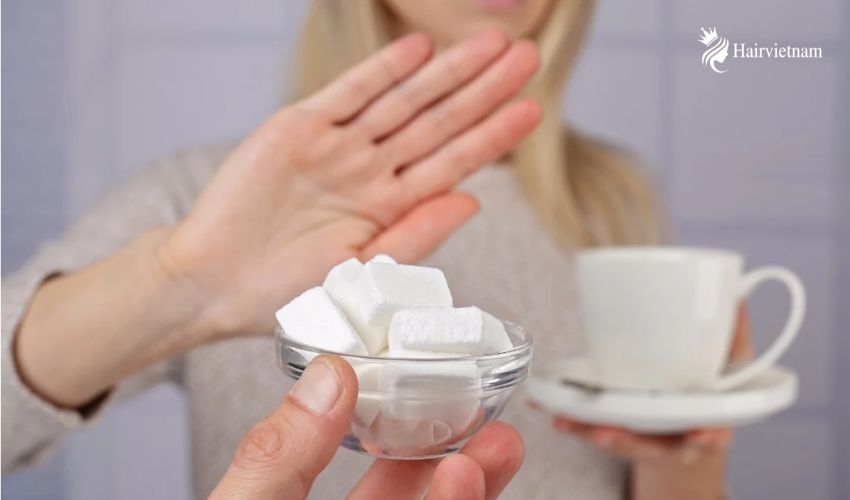Winter Hair Care for Dandruff: Tips for Healthy Hair
26/12/2023
Content
Dandruff issues can be discomforting and itchy, especially intensified during the cold, dry winter. Why does winter contribute to increased dandruff? How can you alleviate itchy dandruff during the winter season? Let's delve into these questions in the following article.

What causes dandruff during winter?
Additionally, the cold winter climate often leads to less frequent hair washing, the use of hot water during showers, or dependence on heating systems, all of which contribute to a drier scalp. The reduced exposure to sunlight also hampers the production of essential vitamin D for scalp health, intensifying the severity of dandruff issues.
Dandruff is often associated with endocrine changes, oily skin, and seborrheic dermatitis, whereas dry scalp is merely a matter of the body losing water, often influenced by environmental factors like cold weather.
Accurately identifying the condition of your scalp helps you choose an appropriate care method.

Scalp massage

Brushing Hair
Remember to approach hair brushing with a gentle touch, avoiding excessive friction on the scalp. This ensures that you promote a healthy scalp without unintentionally worsening any existing conditions.

Wear a Hat

Reduce Sugar

Natural Remedies for Hair Care
1. What causes dandruff during winter?
The dry and chilly winter weather tends to strip the scalp of its natural moisture, causing it to crack and become dry and flaky. Dead skin cells are pushed out in the form of flakes, creating favorable conditions for the development of dandruff.
What causes dandruff during winter?
Additionally, the cold winter climate often leads to less frequent hair washing, the use of hot water during showers, or dependence on heating systems, all of which contribute to a drier scalp. The reduced exposure to sunlight also hampers the production of essential vitamin D for scalp health, intensifying the severity of dandruff issues.
2. Difference between Dandruff and Dry Scalp
Dandruff and dry scalp share common symptoms such as flakiness and itching, but their root causes and treatments diverge. Dandruff typically arises from the overgrowth of a fungus, resulting in larger, oily flakes and scalp irritation. Conversely, dry scalp is often a result of insufficient moisture.Dandruff is often associated with endocrine changes, oily skin, and seborrheic dermatitis, whereas dry scalp is merely a matter of the body losing water, often influenced by environmental factors like cold weather.
Accurately identifying the condition of your scalp helps you choose an appropriate care method.
3. How to get rid of dandruff in winter?
During the winter season, dandruff issues tend to be more prevalent. To address this problem, it is essential to maintain scalp hygiene, use moisturizing products, and pay extra attention to scalp health.3.1 Scalp massage
Massaging the scalp is the best way to care for dry scalp during the winter season. Beyond the delightful sensation of relaxation it brings, scalp massage boosts blood circulation, promoting exfoliation and a cleaner scalp. Consider using coconut or almond oil for your scalp massage once or twice a week to prevent dryness and cracks, effectively putting an end to winter dandruff concerns.
Scalp massage
3.2 Using Anti-Dandruff Oil
Winter dandruff concerns can be effectively addressed by using specialized anti-dandruff shampoos. These shampoos work to eliminate dandruff flakes, penetrating active ingredients into the scalp to alleviate the itching sensation caused by dandruff.3.3 Exfoliate the scalp
Engaging in regular scalp exfoliation is essential to ward off flakiness and inhibit the growth of dandruff. Consistent exfoliation routine aids in removing dead skin cells, preventing their buildup, and mitigating the risk of more severe skin issues such as seborrheic dermatitis, itching, redness, and flaking arising from clogged pores.3.4 Brushing Hair
Gently brushing your hair not only provides a relaxing effect on the scalp but also boosts blood circulation and encourages natural oil production for overall hair and scalp health. A well-nourished scalp helps combat issues like flaking and uncomfortable itching, particularly during the winter season.
Brushing Hair
Remember to approach hair brushing with a gentle touch, avoiding excessive friction on the scalp. This ensures that you promote a healthy scalp without unintentionally worsening any existing conditions.
Learn More: What Are the Benefits of Hair Brushing?
3.5 Reducing Stress
Persistent stress can worsen dandruff. Stay relaxed by engaging in light exercises, practicing yoga, and ensuring you get enough sleep.3.6 Drink water
Staying adequately hydrated is crucial, especially during the winter when it's easy to forget. Dehydration can occur in the skin and hair, leading to dandruff issues.3.7 Avoiding Excessive Heat Exposure
High temperatures can lead to scalp flakiness, especially during winter. Using a hairdryer frequently may contribute to dry scalp issues. It's advisable to gently pat your hair dry with a towel and let it air-dry naturally.4. Tips for Winter Hair Care
To keep your hair healthy during winter, it's crucial to pay special attention to scalp care. Here are some helpful hair care tips shared by HairVietNam.4.1 Wear a Hat
The winter season comes with dry air, chilly winds, and snow, all of which can deplete the moisture from your scalp. This is the main culprit behind dry and prone-to-breakage hair. To combat this, it's a good idea to opt for soft hats with silk or satin linings, helping retain moisture in the scalp and shielding your hair from potential damage.
Wear a Hat
4.2 Choosing the Right Shower Temperature
Enjoying a hot shower on chilly winter days is truly delightful. However, hot water has the tendency to strip away moisture from your hair, leaving it brittle and more prone to breakage. It's recommended to shampoo with lukewarm or cool water to help maintain the health of your hair.4.3 Avoid Going Out with Wet Hair
Wet hair is more prone to damage compared to dry hair. Walking outdoors in winter with wet hair can lead to freezing and breakage. While allowing your hair to air-dry naturally is ideal, it's advisable to gently towel-dry and blow-dry before heading outside.4.4 Reduce Sugar
Sugar not only harms the skin but also has negative effects on hair. Elevated blood sugar levels lead to excess sebum production, increasing the risk of dandruff, especially during winter. Cut down on daily sugar intake and consider alternatives like honey or molasses to care for your hair.
Reduce Sugar
4.5 Dietary Changes
Transforming your daily diet is a key step in addressing itchy dandruff. Boosting your intake of vitamin B, Omega-3, and zinc provides essential nutrients for your scalp and hair. Consider incorporating fruits, salads, eggs, fish, chia seeds, or bananas into your daily meals for improved scalp health.5. Natural Remedies for Hair Care
In addition to the methods mentioned above, you can also utilize tips for caring for dandruff-prone scalp during winter using natural ingredients.
Natural Remedies for Hair Care



















